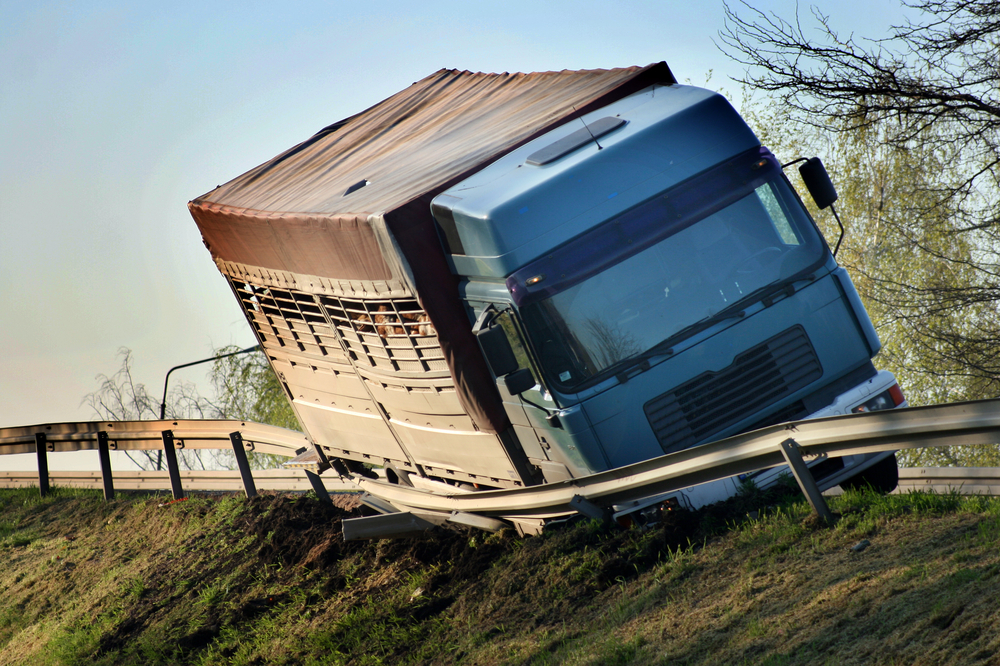
Scottsdale Truck Accident Lawyer
Committed To Your Recovery
Truck wreck victims are often overwhelmed by the physical, emotional, and financial repercussions of their accident. Insurance claims, medical bills, and potential legal proceedings add a lot of chaos to an already painful and difficult time. Our Scottsdale, AZ truck lawyer is here to ease your burdens and simplify the process, so you can focus on your health and recovery. Our goal is to help you secure the maximum compensation you rightfully deserve. Entrusting your case to SL Chapman Trial Lawyers means having a dedicated legal advocate who will fight tirelessly for your rights. Our team has practiced law in Arizona for over 30 years and knows what it will take to win your case. It all begins with a call—reach out today to request your free personal injury consultation.
Table Of Contents
- Committed To Your Recovery
- Relevant Local Laws
- What To Do After A Truck Accident
- Scottsdale Truck Accident Infographic
- Scottsdale Truck Accident Statistics
- Scottsdale Truck Accident FAQs
- Scottsdale Truck Accident Glossary
- SL Chapman Trial Lawyers, Scottsdale Truck Accident Lawyers
- Contact Our Scottsdale Truck Accident Lawyer Today
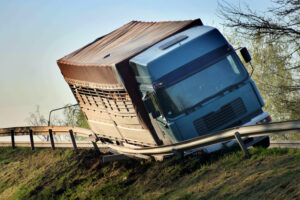
Compensation For Truck Accident Victims
Truck accidents can lead to extensive damages and severe injuries, affecting various aspects of one’s life. If you find yourself a victim of such an accident, it’s important to understand the different types of compensation you may be entitled to, such as medical expenses, lost wages, pain and suffering, property damage, loss of consortium, wrongful death, and punitive damages.
Compensation for medical expenses includes a comprehensive range of medical costs incurred due to the accident. It covers everything from emergency medical care at the scene and immediate hospital stays to long-term medical treatments, physical therapy, and any rehabilitation services needed to recover from injuries sustained in the accident.
If your injuries have prevented you from working, either temporarily or permanently, you may be compensated for lost income. This also encompasses situations where your ability to earn in the future is adversely affected due to the injuries from the truck accident.
Damages for pain and suffering are more subjective and are intended to compensate for the physical pain and mental anguish you have experienced as a result of the accident. This can include compensation for ongoing discomfort, stress, anxiety, and other emotional traumas.
Property damage compensation involves reimbursement for any damage to your vehicle and other personal property that was affected by the accident. It can range from minor repairs to the total replacement of your vehicle if it’s deemed irreparable.
Compensation for loss of consortium is applicable if the accident has adversely affected your relationship with your spouse or family members. It acknowledges the loss of companionship, support, and affection resulting from the injuries sustained. In tragic circumstances where a loved one has died due to a truck accident, the surviving family members can seek compensation. This might cover funeral and burial expenses, loss of future income the deceased would have provided, and compensation for the loss of companionship and emotional support.
Punitive damages are awarded in cases where the actions of the truck driver or the trucking company were especially reckless or malicious. Punitive damages are intended not just as compensation, but as a punishment for the responsible party and a deterrent to prevent similar incidents in the future. Each of these compensation types addresses different aspects of the hardship and loss suffered in a truck crash, providing a means for victims to seek justice and financial relief for their losses.
Relevant Local Laws
Truck accidents in Arizona are governed by a combination of state and federal laws, making these cases more complicated than typical car accidents. Fortunately, our attorneys are here to help you learn what you need to know.
Liability In Truck Accidents
Arizona follows a fault-based system when it comes to motor vehicle accidents, including those involving trucks. This means that the person or entity at fault for the accident is responsible for the damages. However, truck accident cases can involve multiple parties, including the truck driver, the trucking company, the vehicle manufacturer, and others. Our Scottsdale truck accident lawyer can help identify all liable parties and pursue legal action accordingly.
Similar to other vehicle accidents in Arizona, truck accident cases are subject to the comparative negligence rule. Under this rule, each party’s financial recovery is reduced by their percentage of fault. For example, if you are found to be 20% at fault for the accident, your compensation will be reduced by 20%. This emphasizes the importance of thorough investigation and evidence gathering.
Statute Of Limitations
In Arizona, there is a specific timeframe within which you must file a lawsuit following a truck accident. This timeframe, known as the statute of limitations, is generally two years from the date of the accident. Failing to file within this period could result in losing the right to pursue compensation. Therefore, prompt consultation with our truck accident specialist is advisable.
Federal Regulations For Trucking Industry
In addition to state laws, the trucking industry is heavily regulated by federal laws. These regulations, set by the Federal Motor Carrier Safety Administration (FMCSA), govern various aspects of the industry, including hours of service, maintenance standards, and weight limits. Violations of these regulations can play a significant role in establishing liability in a truck accident case.
Insurance Considerations
Arizona requires all drivers, including truck drivers, to carry a minimum amount of liability insurance. However, due to the potential for severe damages in truck accidents, federal regulations often require higher insurance coverage for commercial trucks. Understanding these insurance requirements and managing the claims process can be challenging without legal assistance. Having our knowledgeable legal advocate can significantly impact the outcome of your case.
What To Do After A Truck Accident
Being involved in a truck wreck can be overwhelming due to the significant damages and injuries these devastating collisions often cause. Taking the right steps post-accident can be important for both your immediate safety and any potential legal actions you may pursue.
- Prioritize Safety – If it’s safe and you’re able to do so, move your vehicle out of the traffic lane to a safe location. If you can’t move your car, turn on your hazard lights. Never leave the accident site until it’s appropriate to do so.
- Check For Injuries – Check yourself and any passengers for injuries. If anyone is injured, seek medical attention immediately, even if the injuries seem minor. Some injuries may not manifest symptoms immediately.
- Call 911 – Report the accident to the police. They will document the scene, interview witnesses, and provide a police report, which can be vital when filing an insurance claim or pursuing a lawsuit.
- Exchange Information – Obtain the truck driver’s name, license number, phone number, and insurance information. Note the truck’s license plate, company name, and any other identifying details.
- Document The Scene – If you’re able to, take photos of vehicle damages, injuries, road conditions, skid marks, and any other relevant evidence. If there are any witnesses, collect their contact information and brief statements. Jot down the time, date, weather conditions, and any other specifics about the accident. Proactive documentation will strengthen your personal injury case.
- Avoid Admitting Fault Or Discussing Details – Be cautious about what you say at the scene. Avoid admitting fault or apologizing, as this can be misconstrued as an admission of guilt.
- Seek Medical Attention – Even if you feel fine, it’s essential to see a doctor. Some injuries, like whiplash or concussions, may not show symptoms right away but can have long-term consequences.
- Notify Your Insurance Company – Inform your insurer about the accident as soon as possible. Provide factual information but avoid making definitive statements about fault or injury until you’ve consulted with our lawyer.
- Consult Our Truck Accident Attorney – Truck accidents claims often involve complicated legal issues, given the multiple parties that can be at fault (driver, trucking company, maintenance team, etc.). Our Scottsdale accident lawyer can guide you through the legal process.
- Preserve Evidence – Keep all medical records, repair bills, and any other paperwork related to the accident. If your vehicle is being repaired, take photos of the damages and keep copies of repair invoices.
- Avoid Discussing The Accident On Social Media – Anything you post on social media can potentially be used against you in legal proceedings. It’s best to keep details of the accident and any ongoing litigation private.
Scottsdale Truck Accident Infographic
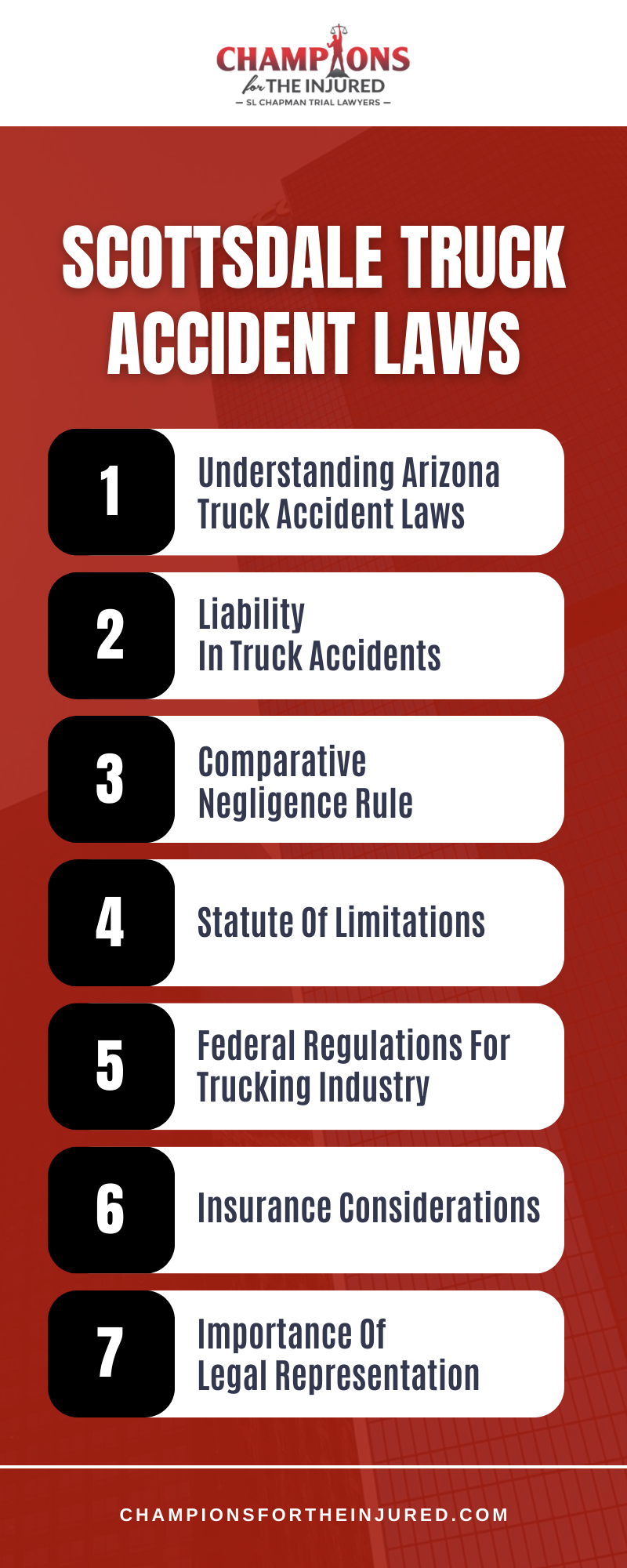
Scottsdale Truck Accident Statistics
According to the National Safety Council (NSC), in 2021, 5,700 large trucks were involved in fatal crashes. This was an 18% increase from 2020 and a 49% increase over the last 10 years. Large trucks are defined as any medium or heavy truck, not including buses and motor homes, with a gross vehicle weight rating greater than 10,000 pounds. Both commercial and non-commercial vehicles are included.
Large trucks accounted for 9% of all vehicles involved in fatal crashes, 5% of all registered vehicles, and 10% of total vehicle miles traveled. If you or a loved one has suffered injuries in a truck accident, contact our truck crash lawyer to find out what legal recourse you may have.
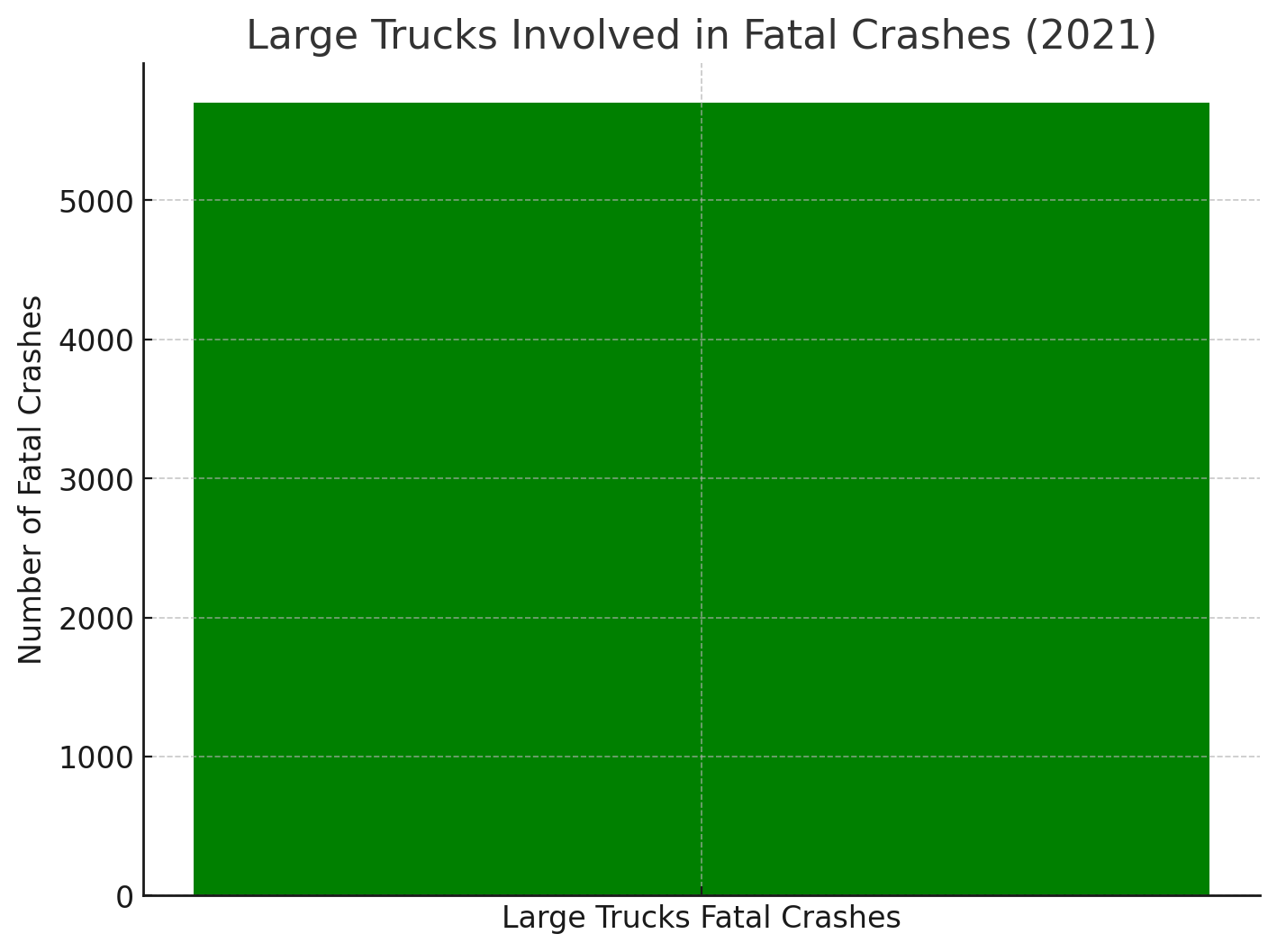
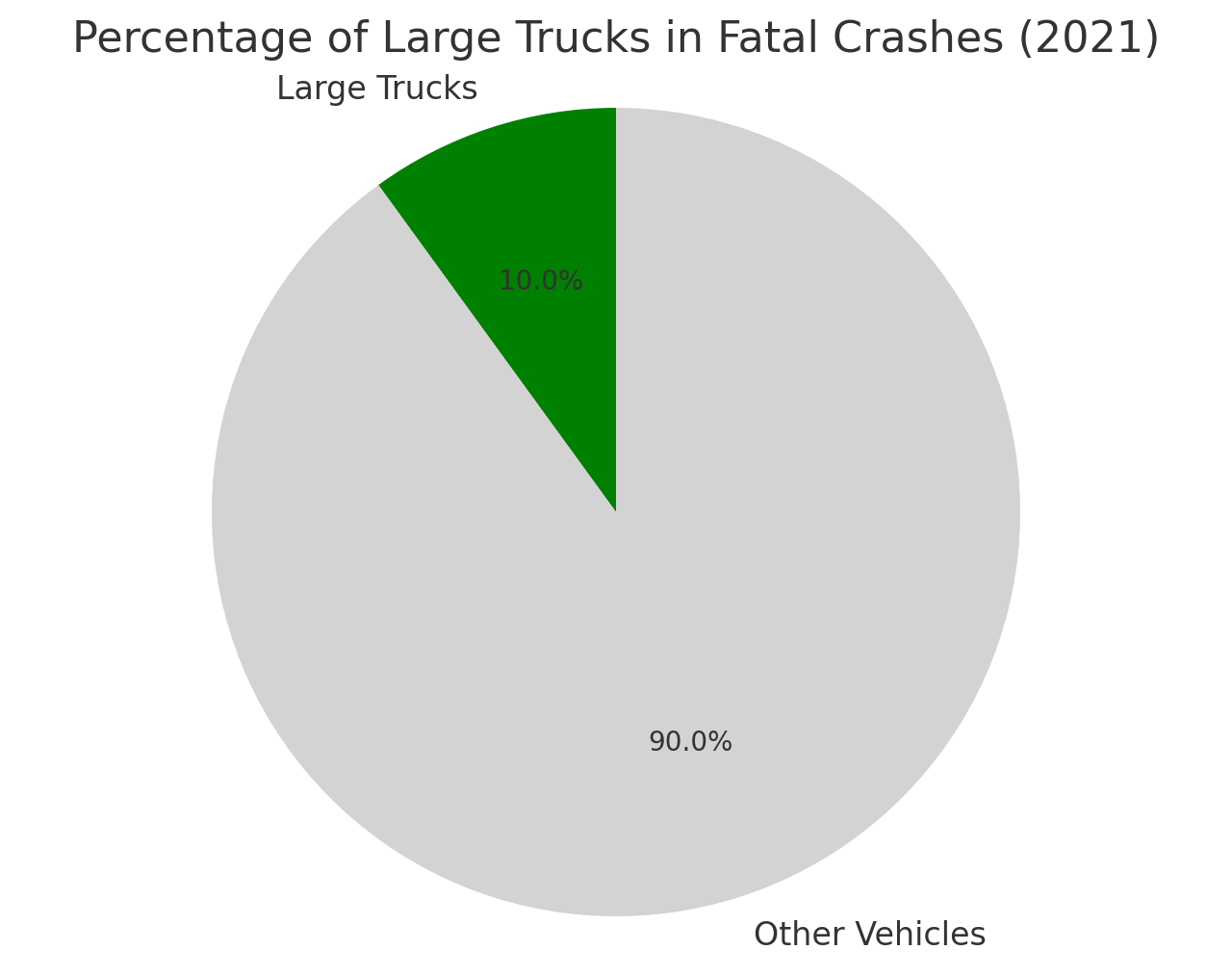
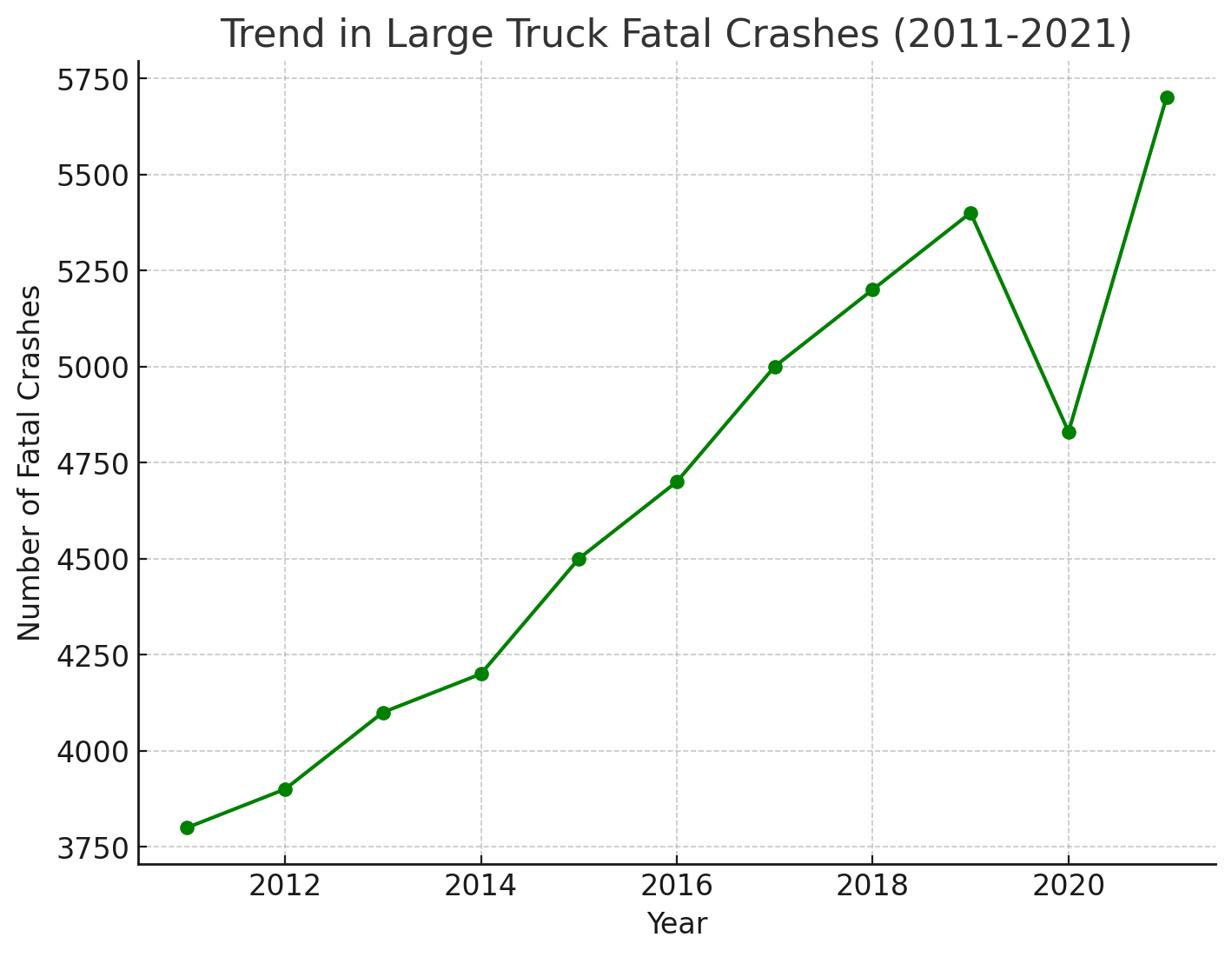
Scottsdale Truck Accident FAQs
How Is Fault Determined In A Truck Accident?
Determining fault in a truck accident involves a thorough investigation. Law enforcement will typically file a report after assessing the scene, which can be an essential piece of evidence. However, fault determination can be more challenging due to the involvement of large vehicles and potentially multiple parties. It may require examining driver logs, vehicle maintenance records, and dashcam or surveillance footage. Sometimes, experts in accident reconstruction are brought in to provide insights.
What Makes Truck Accidents Different From Car Accidents?
Truck accidents differ from car accidents in several ways. First, the sheer size and weight of trucks mean accidents can result in more severe injuries and damage. Second, truck drivers are subject to specific regulations, including hours of service rules and maintenance requirements, which can affect liability. Third, truck accidents often involve more complicated legal and insurance problems, as they can implicate not just the truck driver but also trucking companies, contractors, and insurance companies. Last, the process of collecting evidence can be more complicated, given the logistics and commercial aspects involved.
Can I Claim Compensation If I’m Partially At Fault In A Truck Accident?
Yes, in many jurisdictions, you can still claim compensation even if you’re partially at fault in a truck accident. This depends on the specific laws of the state where the accident occurred. Many states follow a comparative negligence rule, where your compensation may be reduced by your percentage of fault. For instance, if you’re found to be 20% at fault and your damages amount to $100,000, you might still recover $80,000. Understanding these nuances is vital, and a professional legal advisor can offer guidance tailored to your specific situation.
How Long Do I Have To File A Claim After A Truck Accident?
The time limit to file a claim, known as the statute of limitations, varies by state. Typically, you have a period ranging from one to three years from the date of the accident to initiate a lawsuit. However, it’s important to act quickly. Waiting too long can not only risk exceeding the statute of limitations but also potentially weaken your case, as evidence can be lost or become less reliable over time. Early consultation with our injury attorney can help preserve your right to compensation.
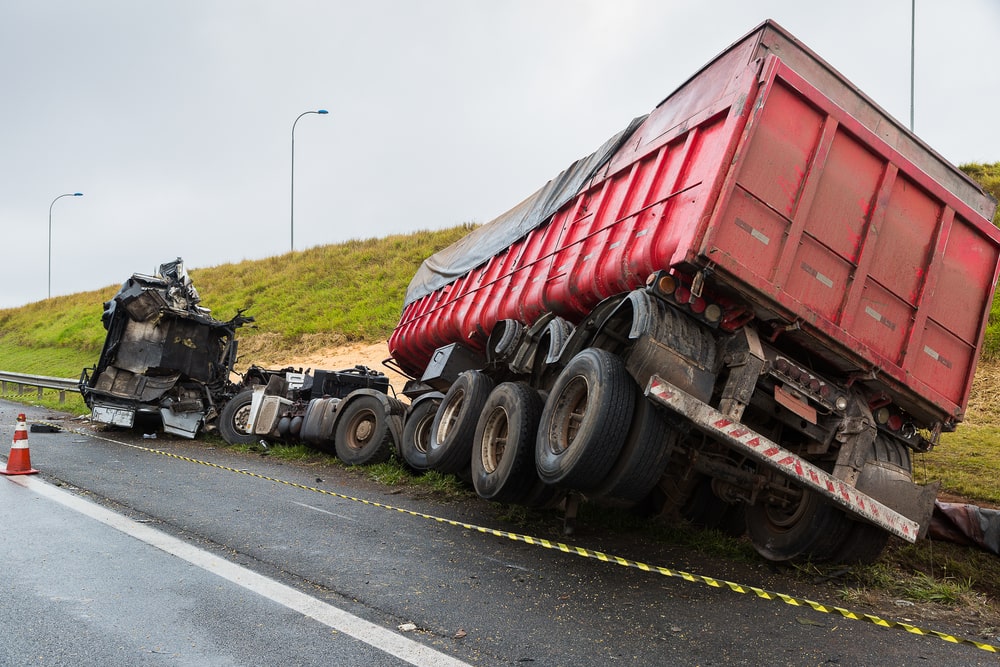
Scottsdale Truck Accident Glossary
At SL Chapman Trial Lawyers, our qualified Scottsdale, AZ truck accident lawyer can help you understand confusing legal concepts so that you are fairly compensated for your losses. Below are five common legal terms or phrases that may be used to describe the various aspects of your personal injury case.
Compensation For Medical Expenses
This refers to the financial reimbursement for all the medical costs you incur as a result of the truck accident. These expenses can include immediate emergency care, surgeries, hospital stays, rehabilitation, and long-term treatments such as physical therapy or psychological counseling. Our personal injury law firm will work to make sure that all present and future medical needs related to the injury are covered by the responsible party, whether it’s the truck driver, their employer, or their insurance company. The goal is to relieve you from the financial burden caused by the accident’s medical aftermath.
Lost Wages
If the truck accident results in injuries that prevent you from working, you may be entitled to compensation for the income you lose as a result. This compensation can cover both lost wages (if you had to take time off work immediately following the accident) and future wages (if your injuries cause long-term or permanent disability that affects your ability to work). Our award-winning Scottsdale truck accident lawyer can help you calculate these losses and work with insurance companies or in court to secure fair compensation that aligns with what your auto injury case is worth. Additionally, if your injury impacts your career advancement or earning potential, those factors can also be considered in the total compensation.
Pain And Suffering
Pain and suffering refer to the emotional and physical distress caused by the accident and the resulting injuries. This can include chronic pain, physical limitations, mental anguish, anxiety, and depression. These non-economic damages aim to compensate the victim for the emotional toll the accident takes on their life. While harder to quantify than medical expenses or lost wages, our skilled personal injury lawyer can present compelling evidence of your pain and suffering, such as medical records, testimony, and expert opinions, to help you receive fair compensation.
Loss Of Consortium
Loss of consortium refers to the loss of the companionship, affection, and support that a spouse or family member may experience as a result of an accident. If the victim’s injuries prevent them from fully participating in family life, or if their relationships suffer due to the trauma or limitations caused by the accident, the family may seek compensation for the emotional and relational damage. This term is often invoked in cases where a serious injury affects a person’s ability to engage in intimacy, caregiving, or other familial responsibilities.
Punitive Damages
Punitive damages are a legal remedy designed not only to compensate the victim but also to punish the at-fault party for particularly reckless or malicious behavior. In the context of truck accidents, punitive damages may be awarded if the truck driver or their employer demonstrated gross negligence or intentional misconduct, such as driving under the influence, excessive speeding, or failing to adhere to safety regulations. The aim is to discourage similar actions in the future by setting an example of financial consequences for egregious behavior.
SL Chapman Trial Lawyers, Scottsdale Truck Accident Lawyers
7135 E Camelback Rd #230, Scottsdale, AZ 85251
Contact Our Scottsdale Truck Accident Lawyer Today
SL Chapman Trial Lawyers recognize that truck accidents are profoundly impactful events. We understand the complicated nature of these incidents and the significant toll they take on individuals and families in terms of physical injuries, emotional trauma, and financial burdens. Our commitment is to stand with those affected, offering our extensive experience and compassionate support to deal with the aftermath of the truck crash. We are dedicated to helping you receive the full spectrum of compensation and justice you rightfully deserve, because we want to see you move forward with everything you need to make an effective recovery. Contact our Scottsdale truck accident lawyer today to schedule a free consultation.


